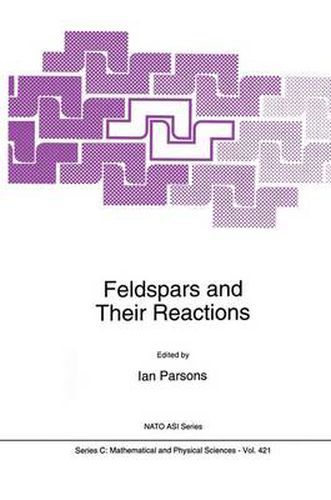Readings Newsletter
Become a Readings Member to make your shopping experience even easier.
Sign in or sign up for free!
You’re not far away from qualifying for FREE standard shipping within Australia
You’ve qualified for FREE standard shipping within Australia
The cart is loading…






This title is printed to order. This book may have been self-published. If so, we cannot guarantee the quality of the content. In the main most books will have gone through the editing process however some may not. We therefore suggest that you be aware of this before ordering this book. If in doubt check either the author or publisher’s details as we are unable to accept any returns unless they are faulty. Please contact us if you have any questions.
Feldspar minerals make up 60% of the crust of the Earth. They are stable in the upper mantle, and are so abundant in the crust that they form the basis of the classification of igneous rocks. At the surface, feldspars weather to form clay minerals which are the most important mineral constituent of soils. The articles in this book review the chemical reactions of feldspars over the whole sweep of pressure and temperature regimes in the outer Earth, and describe the fundamental aspects of crystal structure which underlie their properties. The book covers intracrystalline reactions, such as order-disorder transformations and exsolution, and transfer of stable and radiogenic isotopes, which can be interpreted to provide insights into the thermal history of rocks. It is suitable for final year undergraduates or research workers. The text describes the crystal structures and cell parameters of feldspar minerals, and their phase transitions in the light of vibrational spectroscopy. The kinetics of melting reactions, liquid-crystal, and sub-solidus phase equilibria at high and low pressure are discussed, and the diffusion of stable and riogenic isotopes, including the role of hydrogen. The basis of the classification of igneous rocks and the natural variation of feldspar microstructures are explored, together with feldspars in pegmatites. Surface chemistry is covered, as well as the kinetics of dissolution of feldspars during weathering.
$9.00 standard shipping within Australia
FREE standard shipping within Australia for orders over $100.00
Express & International shipping calculated at checkout
This title is printed to order. This book may have been self-published. If so, we cannot guarantee the quality of the content. In the main most books will have gone through the editing process however some may not. We therefore suggest that you be aware of this before ordering this book. If in doubt check either the author or publisher’s details as we are unable to accept any returns unless they are faulty. Please contact us if you have any questions.
Feldspar minerals make up 60% of the crust of the Earth. They are stable in the upper mantle, and are so abundant in the crust that they form the basis of the classification of igneous rocks. At the surface, feldspars weather to form clay minerals which are the most important mineral constituent of soils. The articles in this book review the chemical reactions of feldspars over the whole sweep of pressure and temperature regimes in the outer Earth, and describe the fundamental aspects of crystal structure which underlie their properties. The book covers intracrystalline reactions, such as order-disorder transformations and exsolution, and transfer of stable and radiogenic isotopes, which can be interpreted to provide insights into the thermal history of rocks. It is suitable for final year undergraduates or research workers. The text describes the crystal structures and cell parameters of feldspar minerals, and their phase transitions in the light of vibrational spectroscopy. The kinetics of melting reactions, liquid-crystal, and sub-solidus phase equilibria at high and low pressure are discussed, and the diffusion of stable and riogenic isotopes, including the role of hydrogen. The basis of the classification of igneous rocks and the natural variation of feldspar microstructures are explored, together with feldspars in pegmatites. Surface chemistry is covered, as well as the kinetics of dissolution of feldspars during weathering.